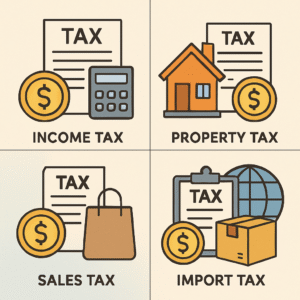One essential component of contemporary society is taxes. It finances infrastructure and public services. For financial literacy, it is essential to comprehend taxation systems.
To raise money, governments levy taxes. Transportation, healthcare, and education are among the vital services that are supported by this revenue.
Globally, taxation systems differ greatly from one another. Even within a single nation, they can vary.
An important part of tax administration is the NYS Department of Taxation. It guarantees adherence to the law and equitable taxation.
Making educated financial decisions is facilitated by having a basic understanding of taxes. It encourages civic engagement as well.
What Constitutes Taxation?
The method by which governments raise money is through taxation. They accomplish this by charging people and companies. To make the money required to operate, this system is crucial.
Taxes are used by governments to fund public goods and services. These consist of schools, hospitals, and roadways. Such infrastructure could not be maintained without taxation.
All members of society are impacted by taxes. Contributions from citizens are determined by their income, consumption, and property. The aim of shared community benefits is supported by this universal contribution. Being an informed member of society requires an understanding of how taxes are administered.
Why Do Taxes Get Imposed by Governments?
In order to finance public services, taxes are essential. These services consist of infrastructure, healthcare, and education. Such financing is essential to the health of society.
Taxes are another tool that governments use to affect economic activity. Tax breaks could promote innovation or investment. On the other hand, higher taxes can discourage negative actions like pollution.
Governments impose taxes for a number of primary reasons:
- Increasing the amount of money collected for public services
- Regulating economic activity
- Redistributing income to advance equity
Therefore, taxes have uses beyond just raising money. It has a big influence on national priorities and policies.
Primary Tax Types
There are several types of taxes, each with a specific purpose. Comprehending these categories aids in understanding the larger tax structure. We examine the most popular categories here.
Individual earnings are subject to income tax. Corporate taxes are levied against the profits of businesses. Purchased goods and services are subject to sales tax. Ownership of real estate is subject to property taxes.
Common tax forms consist of:
- Taxes on income
- Business taxes
- Taxes on Sales and Consumption
- Property Taxes
The contributions made to government budgets by each tax type vary. Together, they influence national budgetary policies. This variety guarantees that taxes successfully meet a range of economic needs.

Taxes on income
One of the main sources of funding for governments is income taxes. Earnings determine how much people and organizations pay. Higher earners are more affected because it is frequently progressive.
Business taxes
Corporations pay corporate taxes. The company’s profits are the basis for these taxes. They help oversee business operations and financial commitments.
Taxes on Sales and Consumption
Purchased goods and services are subject to sales tax. At the point of sale, these indirect taxes are collected. They frequently have an immediate impact on customers.
Property Taxes
Property taxes are levied on real estate ownership. They fund local services like schools and roads. Rates differ based on property value and location.
How Taxation Systems Work
Taxation systems operate through defined frameworks. These frameworks guide tax collection and compliance. They ensure funds for public services.
Governments rely on laws to structure tax systems. Clear rules determine how taxes are calculated. These rules dictate payment schedules and enforcement measures.
Key processes in taxation systems include:
- Assessment of taxable income or property
- Application of tax rates
- Collection and auditing
Efficient systems depend on technology and administration. Modern tools enhance tax collection and auditing accuracy. This safeguards public revenues and fiscal responsibility.
Taxation Determination: How Is Tax Owed Calculated?
Taxation determination involves figuring out the amount owed. This depends on various factors like income or property value. Calculations must adhere to legal guidelines.
Each taxpayer’s situation is unique. Authorities consider taxable income, deductions, and credits to assess liabilities. Accuracy in these calculations is crucial.
Steps for taxation determination include:
- Identifying taxable income
- Applying relevant deductions and credits
- Calculating the tax liability based on tax rates
These steps ensure fairness. They also help prevent overpayments or underpayments, maintaining balance in tax obligations.
The Role of the NYS Department of Taxation
The NYS Department of Taxation administers tax laws in New York State. It ensures taxpayers comply with regulations and remits taxes timely.
This department plays a crucial role by:
- Collecting taxes and fees
- Assisting taxpayers with guidance
- Conducting audits to ensure compliance
Their work guarantees funds for public services and infrastructure. Efficient tax administration is essential for New York’s economic health and well-being.
Tax Compliance and Enforcement
Tax compliance ensures that individuals and businesses pay their taxes fully and on time. Enforcement involves actions taken against non-compliance to maintain fairness.
Key enforcement activities include:
- Conducting audits
- Implementing penalties for non-payment
- Prosecuting tax evasion cases
These measures are vital for the integrity of the taxation system, ensuring everyone pays their fair share, and supporting public resources.
Challenges and Trends in Modern Taxation
Modern taxation faces numerous challenges due to the digital economy and globalization. Rapid technological advancements often outpace current tax laws, requiring constant adaptation.
Emerging trends include:
- Digital transaction taxation
- Cross-border cooperation for tax compliance
- Measures to address tax avoidance
These developments are reshaping how governments collect and enforce taxes, emphasizing the need for innovation and international collaboration in tax policy.
Why Understanding Taxation Matters
Understanding taxation is fundamental for informed citizenship. It helps individuals participate in policy discussions and comprehend the impact of tax laws on daily life.
Awareness of taxation also enables better financial planning. By knowing tax regulations and rights, taxpayers can make informed decisions and avoid unnecessary penalties. Knowledge of taxation ultimately empowers individuals and supports democratic processes.
